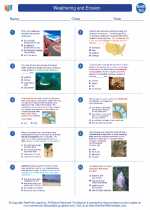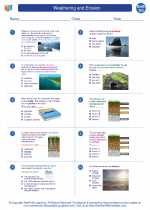Lakes
A lake is a large body of water surrounded by land. It is often formed in depressions on the Earth's surface, such as those created by glacial erosion, volcanic activity, or tectonic movements. Lakes can vary greatly in size, depth, and water quality.
Formation of Lakes
Lakes can be formed through various processes, including:
- Glacial activity: Glaciers can carve out depressions in the Earth's surface, which fill with water to form lakes.
- Volcanic activity: Volcanic craters and calderas can fill with water, creating volcanic lakes.
- Tectonic activity: Faulting and subsidence can create depressions that fill with water to form tectonic lakes.
- Human activity: Some lakes are created by human-made dams for purposes such as water supply, hydroelectric power generation, or recreation.
Lake Ecology
Lakes support diverse ecosystems, including various plant and animal species. Factors such as water temperature, nutrient levels, and sunlight availability can influence the ecological dynamics of a lake.
Types of Lakes
Lakes can be classified based on different criteria, such as:
- Origin: Natural lakes, glacial lakes, volcanic lakes, and human-made reservoirs.
- Salinity: Freshwater lakes and saline (salty) lakes.
- Depth: Shallow lakes, deep lakes, and crater lakes.
Human Uses of Lakes
Humans utilize lakes for various purposes, including:
- Drinking water supply
- Recreation: Fishing, boating, swimming, and other water-based activities
- Hydroelectric power generation
- Agriculture: Irrigation and livestock watering
Environmental Issues
Lakes can face environmental challenges, such as pollution, eutrophication (excessive nutrient enrichment), invasive species, and habitat degradation. Conservation efforts are important for preserving the health and integrity of lake ecosystems.
Study Guide Questions
- What are the main processes involved in the formation of lakes?
- Discuss the ecological significance of lakes and the factors that influence their ecosystems.
- Explain the different types of lakes based on their origin and characteristics.
- How do human activities impact lake ecosystems, and what are the potential environmental issues associated with lakes?
- Discuss the importance of conservation and sustainable management of lakes.
[Lakes] Related Worksheets and Study Guides:
.◂Earth Science Worksheets and Study Guides High School. Weathering and Erosion

 Worksheet/Answer key
Worksheet/Answer key
 Worksheet/Answer key
Worksheet/Answer key
 Vocabulary/Answer key
Vocabulary/Answer key
 Vocabulary/Answer key
Vocabulary/Answer key
 Vocabulary/Answer key
Vocabulary/Answer key
